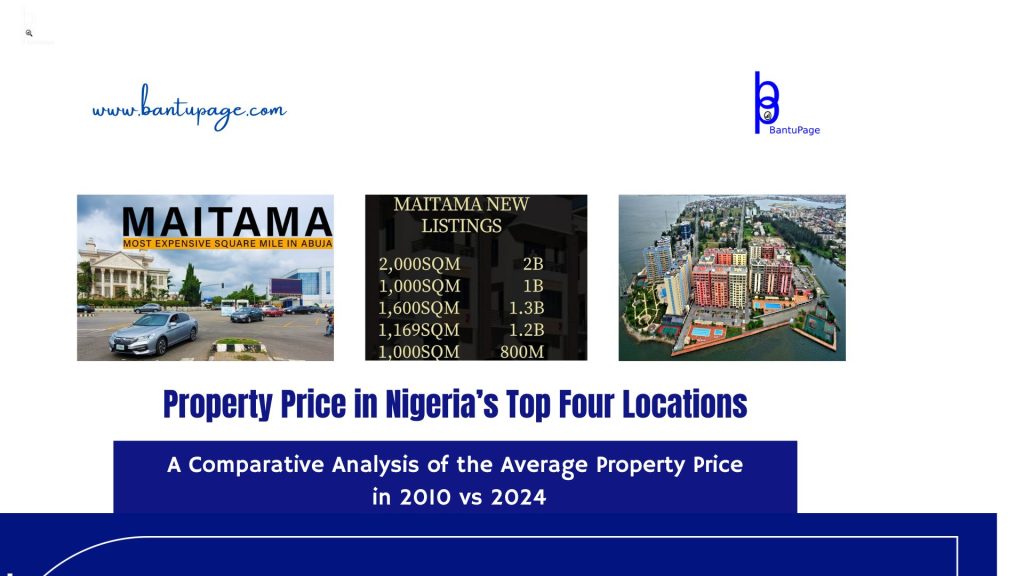
Significant Decline in Property in Nigeria’s Top Four Locations:
A Comparative Analysis of 2010 and 2024
When adjusted with inflation, investing in real estate in Nigeria is a dead trap. Between 2010 and 2024, a coefficient value puts properties at almost three times less. The naira tumbling did not spare the real estate market; in fact, it is one of the most heavily affected. If you are buying to live, you may even have an advantage if you are moving in from overseas, given the weak naira. But if you are an investor buyer, you better think twice. Any naira that spends the night in your bank account could be worth half its value when you hear the sound of good morning. So, too, is any property you invest in with long-term revenue prospects in mind.
Ikoyi, Lagos
In 2010, the average property in Ikoyi was ₦120 million, equivalent to $983,000. Today, the average property in Ikoyi is ₦700 million, equivalent to $466,666. The ₦120 million in 2010 is more than twice as high as the ₦700 million in 2024, leaving a deficit of -$516,940 in dollars and a plus of ₦580 million.
 Chart A
Chart A
Maitama, Abuja and Lekki Phase I, Lagos
In 2010, the average Maitama and Lekki Phase I properties was ₦90 million, equivalent to $737,704. Today, it is ₦400 million, equivalent to $266,666. That is a deficit of -$471,038 and a plus of ₦320 million.
Asokoro, Abuja
In 2010, the average in Asokoro was ₦70 million, equivalent to $573,770. Today, it is ₦300 million, equivalent to $200,000, leaving a deficit of -$337,770 and a plus of ₦230 million.
 Chart B
Chart B
Dollar average was $1 to ₦122 in 2010 and $1 to ₦1,500 in 2024
In other words, Nigerian property have fallen more than twice in value in just 14 years. The same is true for income and purchasing power. Income has remained relatively the same while the cost of living have skyrocketed. This is how poverty increases, in a nutshell. Nigerians are working twice as hard for twice as less income. The revenue generated is suffocated by our overreliance on the US dollar since most things we use are imported at the rate of a foreign currency. Nigeria has a dependent economy. It is very vulnerable to sanctions and interest rates set in other countries. No independent country should operate like this.
The Employed and Poor
A civil servant earning ₦70,000 in 2010 still makes ₦70,000-₦100,000 in 2024. In a real monetary sense, their income is less than ₦15,000 when adjusted for inflation. The largest Nigerian working class are the ’employed and poor.’ People who are employed but still live in abject poverty make up the majority of the Nigerian working class. When people are employed but still live in poverty, this will reflect their performance and priorities. Have you ever wondered why Nigeria’s public offices are in disarray, with civil servants sometimes not proactively paying attention to their duties or soliciting bribes to do their job? This is a direct result of their underpayment. Humans find ways to survive; happy employees make a happier company.
Most employed Nigerians, whether public or private, are unlikely to own property. The naira depreciation, high interest rates, and inflation mean that the poverty trenches widen. Everyone cannot be prosperous. Everyone will not be wealthy. Those are different things. I know your teachers, parents, and people in power have preached all kinds of platitudes that if you work hard and study, you will achieve success. Let me break the ice; that is not technically correct. Everyone cannot be successful in a capitalistic setting. In essence, that is what capitalism is all about. Some people rise to the top, while others remain at the bottom. This is the structure of capitalism. When individuals compete against each other, some will emerge victorious, while others will not. Simple.
The future of every child born in Nigeria looks bleak. Although we rarely express this, the data clearly points in that direction. While Nigeria has never been rich, it has never been this poor. Unprecedentedly, it has never descended so low within such a brief period. President Bola Ahmed Tinubu’s administration has accelerated the poverty rate. The previous administration of former President Muhammadu Buhari facilitated this situation. What 2025 will bring to Nigeria is unknown, but if the train wreck continues, Nigeria could descend into the kind of protest we saw in Kenya.
By Ikechukwu ORJI





